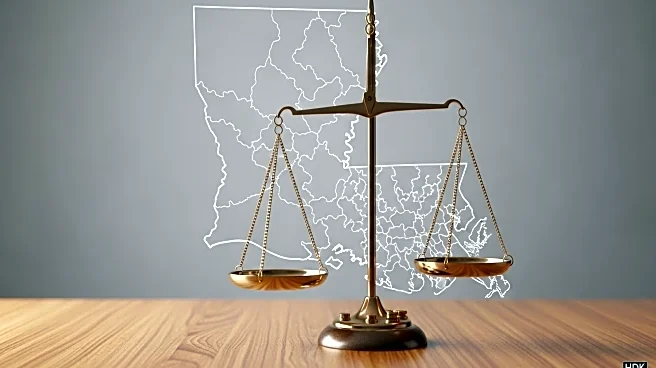What's Happening?
The Supreme Court is currently reviewing a case that could significantly impact gerrymandering reform initiatives, particularly concerning minority representation. The case, Callais v. Landry, challenges Louisiana's 2024 redistricting plan, Senate Bill 8 (SB 8), on the grounds of racial gerrymandering. The plaintiffs argue that the plan violates the Equal Protection Clause of the Fourteenth Amendment by constituting an unconstitutional racial gerrymander. The case has already produced a detailed record in the lower courts, with a three-judge panel of the U.S. District Court for the Western District of Louisiana concluding that District 6 of SB 8 violates the Equal Protection Clause. The Supreme Court's decision could redefine how race may be considered in drawing political maps, influencing voting power and congressional balance far beyond Louisiana.
Why It's Important?
The outcome of Callais v. Landry could have significant implications for the balance between the Voting Rights Act and the Constitution's promise of equal protection. If the Supreme Court rules in favor of the plaintiffs, it could set a national precedent on the limits of race-conscious redistricting, potentially leading to the elimination of up to 19 Democratic-held seats currently protected by the Voting Rights Act. This ruling could intensify efforts by Republican-controlled states to redraw district lines to secure their majority in the House of Representatives. The case highlights the ongoing debate over how race should factor into the creation of voting districts, a question central to American democracy.
What's Next?
The Supreme Court's decision, expected later this term, will determine if Louisiana must redraw its map again. The ruling could set a national precedent on the limits of race-conscious redistricting, influencing voting power and representation far beyond Louisiana. The state and its Secretary of State, Nancy Landry, argue that the legislature acted lawfully in response to earlier federal orders requiring better representation for Black voters. The decision will be closely watched by political leaders, advocacy groups, and civil society organizations, as it could reshape the landscape of voting rights and representation in the United States.
Beyond the Headlines
The case underscores a broader question about how ordinary citizens become symbolic litigants in disputes that may redefine the nation’s voting-rights landscape. The anonymity of the Callais plaintiffs highlights how modern constitutional test cases are often organized by lawyers or advocacy groups seeking a particular ruling. Similar strategies have guided landmark civil-rights and social-policy cases for decades, but the anonymity of the Callais plaintiffs stands out.










